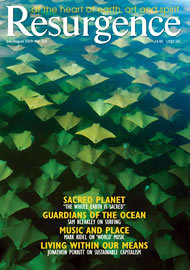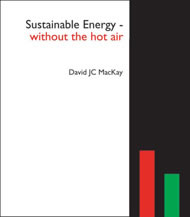FOR THOSE OF us who are applying ourselves to the energy question, the rhetoric is often punctuated by adjectives – we talk of “huge” or “enormous” quite a lot. In fact the sector is dominated by men, and the subject gets a very male treatment. We are obsessed by size – megawatts, terawatts – how much installed capacity do you have? Perhaps this is why the industry, and the energy systems we have, are all about size, and it is only the more insightful types who advocate smaller, more flexible, decentralised approaches. What kind of energy system would women have designed, I wonder?
However, all this obsession with scale has not led us, until now, to do much in the way of engaging in the mind-numbing business of counting it all. David MacKay, a Cambridge University professor of physics, has done us the huge favour of assessing the enormous amount of data out there on energy production and consumption in the UK. His purpose is to provide the empirical basis for truly useful discussions, and therefore effective action, on deciding how to develop the UK’s energy systems for the future.
This can’t be avoided, as we are to lose a dramatic proportion of our coal and nuclear power production in the next fifteen years or so. Ironically, I can’t find a precise figure for this in the book, but it looks like around two-thirds. That being the case, how do we fill the gap? My conclusion is that it depends on many factors, mostly political and cultural.
The thing is, we could go 100% for renewables, but it would depend on a cultural shift. Onshore wind power would need to be massively ramped up, and this would require an all-out victory in the battle for hearts and minds. In recent research, I found that in Denmark there has been a reduction in public support for wind due in part to the removal of incentives for local people, the growth in turbine size, and the move towards more corporate ownership of the turbines. Giving local communities a share of the turbines means that when they see them turning they know there is money being generated for them, not just green energy.
In a world that has become increasingly individualistic and materialistic, this is an approach that may be vital in the potential transition to towards a more socially responsible society. There can be nothing more important than bringing citizens into climate- and environment-protecting activities. The greening of the economy will utterly depend on it. It makes sense, and the energy-efficiency agenda is another clear example of money saving.
Although MacKay doesn’t look at policy in detail, he does show the practices that can bring about energy demand reductions in very effective ways. However, it is not by doing a little that we can achieve a lot, a point he rams home repeatedly. It will take real commitment. Demand reduction can be augmented by smart grid development: energy grids that use
telecommunications technology to, for example, switch off freezers at times of high demand, or display real-time grid information to let you know when the grid is under strain. If this were tied to dynamic energy tariffs, you would want to switch off a few appliances and pay less, no?
Again, it is likely to be people’s wallets, not their hearts, that dictate such behaviour in the near future, mainly due to the laziness and selfishness bred into us in the postwar era, particularly 1980s conservatism, and reinforced daily by the lifestyle signals which constantly bombard us. In Britain we are frustrated by mixed messages from government. If our leaders tell us to change our light bulbs and take action on climate change, are we not going to become confused and cynical when they then do their utmost to push airport expansion?
What MacKay’s work makes clear is that we can have any energy future we choose, but it is easy to imagine that it will be decided the old-fashioned way: those with the biggest wallets get their way with the government. The alternative is a rational discussion between all engaged stakeholders on what kind of energy infrastructure would best suit our geography, especially our free renewables endowment, and finding a way to make it happen smoothly. I believe it should be guided in part by the question of what we should leave our children. An energy system that is clean and inexhaustible is possible, if enough people can be persuaded of the logic of this. •
Miguel Mendonça is research manager for the World Future Council. He is the author of Feed-in Tariffs: Accelerating the Deployment of Renewable Energy.







